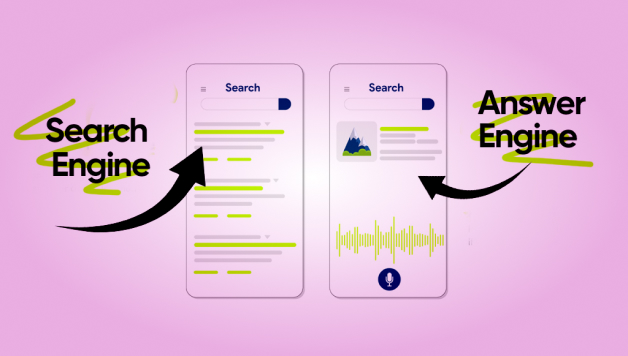Search Engine vs Answer Engine: How Do They Work Differently?
The internet has transformed how we access information, with search engines playing a dominant role for decades. However, a shift is underway with the rise of answer engines, which aim to provide direct responses rather than a list of web pages. This shift reflects a growing need for immediate, precise information instead of traditional search results that require further exploration.
Understanding the difference between a search engine vs answer engine is crucial for businesses, marketers, and content creators. While both serve the purpose of retrieving information, they operate in distinct ways, impacting how users interact with online content.
How Search Engines Work
Search engines, like Google and Bing, function as vast digital libraries that index and rank web pages based on various factors. When a user enters a query, the search engine scans its database, retrieves relevant results, and displays them in a ranked order.
These rankings are determined by complex algorithms that assess elements like keyword relevance, backlinks, website authority, and user engagement. While search engines provide multiple sources, users must often browse through links to find the most relevant information.
From an SEO perspective, businesses optimize their websites to rank higher on search engine results pages (SERPs). Traditional SEO strategies involve keyword placement, meta descriptions, high-quality content, and link-building efforts. However, with the growing influence of artificial intelligence, search engines are now prioritizing user intent, making content quality more important than ever.
The Rise of Answer Engines
Unlike search engines that provide multiple links, answer engines focus on delivering direct, concise responses. They aim to understand user intent deeply and offer specific answers without requiring users to navigate multiple web pages.
AI-driven technologies, such as natural language processing (NLP) and machine learning, play a critical role in answer engines. Voice assistants like Siri, Google Assistant, and Alexa exemplify how answer engines work—when asked a question, they provide a single, precise response rather than a list of possible answers.
This shift towards direct answers has changed how content is structured. Instead of relying solely on traditional SEO tactics, businesses must now consider AEO vs SEO (Answer Engine Optimization vs Search Engine Optimization). While SEO focuses on ranking in search results, AEO prioritizes structuring content so it can be directly extracted and presented as an answer.
Key Differences Between Search Engines and Answer Engines
The core difference between a search engine vs answer engine lies in their approach to delivering information. Search engines offer a variety of results, allowing users to explore different perspectives. In contrast, answer engines extract precise data from trusted sources and provide a single, authoritative answer.
- User Experience and Intent
- Search engines cater to users who want to research a topic by presenting multiple options.
- Answer engines focus on providing quick and direct responses, making them ideal for factual queries.
- Content Retrieval and Display
- Search engines rank and display web pages based on numerous SEO factors.
- Answer engines extract structured data and generate responses based on AI-driven analysis.
- Optimization Strategies
- SEO involves optimizing for search algorithms, keywords, backlinks, and user engagement.
- AEO emphasizes content structuring, schema markup, and AI-driven query matching.
What This Means for Digital Marketing
For businesses and content creators, the emergence of answer engines presents new challenges and opportunities. While traditional SEO remains essential for ranking in search engines, AEO vs SEO is becoming an important consideration for voice search, smart assistants, and AI-powered platforms.
Optimizing content for answer engines requires a shift towards structured, concise, and authoritative information. This means using schema markup, answering commonly asked questions clearly, and ensuring content aligns with AI-driven algorithms.
The Future of Online Search
As AI continues to evolve, the distinction between a search engine vs answer engine may become less pronounced. Search engines are already integrating answer-based features, such as Google’s featured snippets and knowledge panels. Meanwhile, answer engines are improving their ability to provide nuanced, contextual responses.
For businesses, adapting to this changing landscape is key. Balancing traditional SEO strategies with AEO techniques ensures visibility across both search and answer-based platforms. Whether users are typing queries into search bars or speaking them into voice assistants, content needs to be optimized for how information is retrieved today—and in the future.
Read More: Key Features of the Best Full-Stack Frameworks in 2025














Post Comment